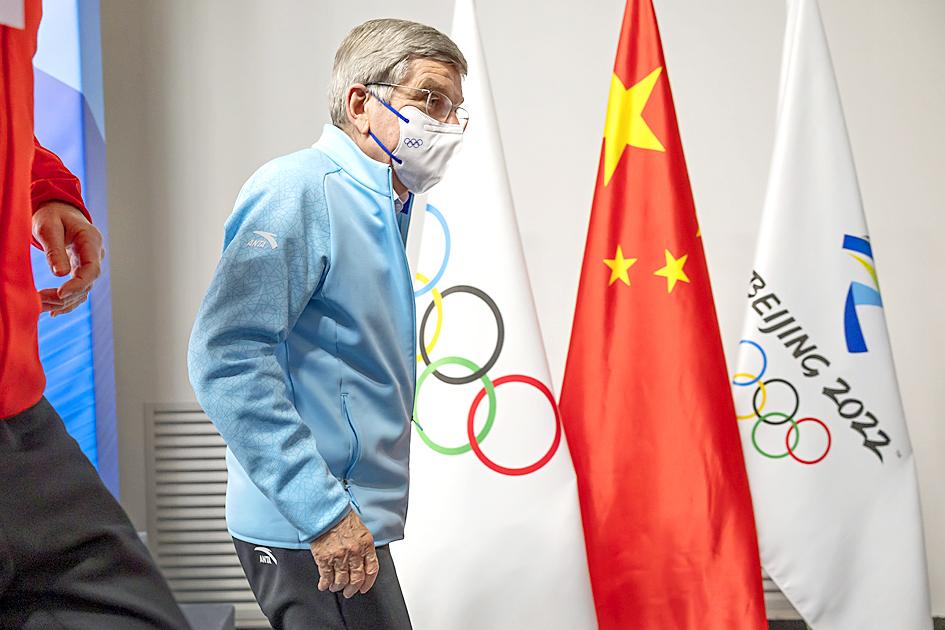The government on Friday rebuked China for using the Beijing Winter Olympics to assert its claims of sovereignty over Taiwan, saying that China had “cast a shadow” over the peaceful spirit of the event to spread propaganda.
Yan Jiarong (嚴家蓉), a spokeswoman for the Beijing Organizing Committee for the Olympic Games (BOCOG), on Thursday spoke of China’s position regarding Taiwan at a news conference attended by International Olympic Committee (IOC) spokesman Mark Adams.
“What I want to say is that there is only one China in the world. Taiwan is an inalienable part of China. This is a widely recognized principle of international relations and a consensus in international society,” the former UN envoy said.

Photo: EPA-EFE
Yan also responded similarly to questions concerning Xinjiang, calling reports about forced labor camps in the region “a lie” told by “some groups with malicious intentions.”
In Taipei, the Mainland Affairs Council on Friday said that “the people of Taiwan firmly oppose” Beijing’s “one China” principle.
“The Republic of China is a sovereign state, and Taiwan has never been part of the People’s Republic of China,” the council said, adding that it condemned China for interfering with international sports activities by asserting its politics.
The Ministry of Foreign Affairs also rejected Yan’s claims as untrue and said that the remarks “undermined the integrity of Taiwan’s sovereignty.”
The ministry also criticized China for spreading “inappropriate” political propaganda at the Olympics, saying that Beijing had breached the rule of political neutrality enshrined in the Olympic Charter.
“No kind of demonstration or political, religious or racial propaganda is permitted in any Olympic sites, venues or other areas,” the charter says.
Yan’s comments have also caused concern for IOC president Thomas Bach, who sidestepped questions about Xinjiang at the Games’ opening ceremony, citing political neutrality.
“We were in touch with BOCOG immediately after this press conference,” the New York Times cited Bach as saying on Thursday. “Both organizations, BOCOG and the IOC, have restated the unequivocal commitment to remain politically neutral, as it is required by the Olympic Charter.”
Yan’s remarks about Taiwan, which has four athletes at the Games, comes as China steps up efforts to limit the nation’s participation in international events and affairs.
The four athletes took part in the Games’ opening ceremony after the team said it had received “several notices” by the IOC urging them to attend the opening and closing ceremonies.
Last month, Taiwan initially said that its athletes would not attend due to delayed flights and China’s COVID-19 prevention measures.

ENDEAVOR MANTA: The ship is programmed to automatically return to its designated home port and would self-destruct if seized by another party The Endeavor Manta, Taiwan’s first military-specification uncrewed surface vehicle (USV) tailor-made to operate in the Taiwan Strait in a bid to bolster the nation’s asymmetric combat capabilities made its first appearance at Kaohsiung’s Singda Harbor yesterday. Taking inspiration from Ukraine’s navy, which is using USVs to force Russia’s Black Sea fleet to take shelter within its own ports, CSBC Taiwan (台灣國際造船) established a research and development unit on USVs last year, CSBC chairman Huang Cheng-hung (黃正弘) said. With the exception of the satellite guidance system and the outboard motors — which were purchased from foreign companies that were not affiliated with Chinese-funded

PERMIT REVOKED: The influencer at a news conference said the National Immigration Agency was infringing on human rights and persecuting Chinese spouses Chinese influencer “Yaya in Taiwan” (亞亞在台灣) yesterday evening voluntarily left Taiwan, despite saying yesterday morning that she had “no intention” of leaving after her residence permit was revoked over her comments on Taiwan being “unified” with China by military force. The Ministry of the Interior yesterday had said that it could forcibly deport the influencer at midnight, but was considering taking a more flexible approach and beginning procedures this morning. The influencer, whose given name is Liu Zhenya (劉振亞), departed on a 8:45pm flight from Taipei International Airport (Songshan airport) to Fuzhou, China. Liu held a news conference at the airport at 7pm,

Taiwan was ranked the fourth-safest country in the world with a score of 82.9, trailing only Andorra, the United Arab Emirates and Qatar in Numbeo’s Safety Index by Country report. Taiwan’s score improved by 0.1 points compared with last year’s mid-year report, which had Taiwan fourth with a score of 82.8. However, both scores were lower than in last year’s first review, when Taiwan scored 83.3, and are a long way from when Taiwan was named the second-safest country in the world in 2021, scoring 84.8. Taiwan ranked higher than Singapore in ninth with a score of 77.4 and Japan in 10th with

GRIDLOCK: The National Fire Agency’s Special Search and Rescue team is on standby to travel to the countries to help out with the rescue effort A powerful earthquake rocked Myanmar and neighboring Thailand yesterday, killing at least three people in Bangkok and burying dozens when a high-rise building under construction collapsed. Footage shared on social media from Myanmar’s second-largest city showed widespread destruction, raising fears that many were trapped under the rubble or killed. The magnitude 7.7 earthquake, with an epicenter near Mandalay in Myanmar, struck at midday and was followed by a strong magnitude 6.4 aftershock. The extent of death, injury and destruction — especially in Myanmar, which is embroiled in a civil war and where information is tightly controlled at the best of times —